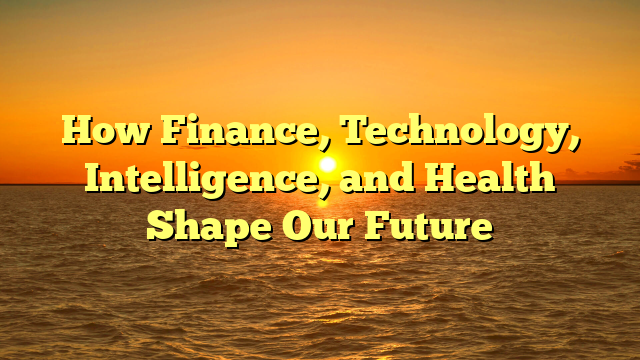As the world advances, the interrelation between finance, innovation, cognition, and health becomes more prominent. These domains influence each other continuously, and their integration is vital for the future of humanity. Today, we explore the impact these fields have on our daily lives and how they shape the world around us.
Finance and Technology: Driving Economic Growth
Finance plays a crucial role in ensuring economic stability and fostering growth, but the landscape is continuously changing with the advent of technology. The emergence of digital currencies, blockchain technology, and artificial intelligence (AI) in financial analysis is changing how transactions, investments, and even budgeting are handled. Cryptocurrencies like Bitcoin and Ethereum have introduced new ways to store and transfer value.
Moreover, blockchain, which underpins these currencies, offers a decentralized system for transactions, increasing transparency and security. As financial institutions adopt these technologies, they gain access to greater efficiency, transparency, and security, making the entire system more resilient. Financial technology startups are also gaining momentum by developing innovative solutions that make financial services more accessible to people worldwide, from mobile banking to peer-to-peer lending.
With DEWAKOIN and machine learning algorithms, finance professionals can analyze large volumes of data to predict market trends and optimize investment strategies.
Artificial Intelligence and Cognitive Advancements
AI is pushing the boundaries of what we understand as intelligence, particularly in fields such as healthcare, finance, and cognitive sciences. As AI systems become more sophisticated, they replicate human cognitive functions such as learning, problem-solving, and pattern recognition. These advancements are opening new frontiers for how we approach problems in diverse areas, from medicine to economic modeling.
AI’s impact extends far beyond machine learning algorithms. Artificial Intelligence plays a key role in transforming healthcare, helping to streamline diagnostic processes and deliver more tailored treatments. Additionally, AI enhances cognitive processes in decision-making. By processing data faster and more efficiently than humans, AI systems are increasingly used in industries such as banking to predict trends and optimize performance.
However, the integration of AI into society also presents challenges, such as ethical dilemmas around privacy, autonomy, and the potential for job displacement.
The Future of Health in a Technology-Driven World
Technology has profoundly affected the healthcare sector, where advancements such as telemedicine, AI-assisted diagnostics, and robotics are changing how care is delivered. Telemedicine, for example, allows patients to consult doctors remotely, breaking down geographical and logistical barriers to care. Telemedicine offers patients access to quality healthcare services without the need for in-person visits, which is especially valuable for people in remote or underserved regions.
Wearable health devices, such as smartwatches and fitness trackers, are also making it easier for individuals to monitor their health in real-time. These devices track vital signs such as heart rate, sleep patterns, and physical activity, allowing users to make informed decisions about their health. Moreover, with the integration of AI and big data, healthcare providers can offer more personalized and efficient care, ensuring better outcomes for patients.
Robotic surgeries are another groundbreaking innovation that has transformed the field of medicine. With greater precision and less invasive procedures, these surgeries lead to faster recovery times and reduced risk of complications.
The Future of Finance, Technology, Intelligence, and Health
The synergy between finance, technology, intelligence, and health will continue to evolve, creating new opportunities for growth, better quality of life, and more efficient systems worldwide.
Ultimately, the convergence of finance, technology, intelligence, and health will lead to better global collaboration, more efficient systems, and improved individual well-being.
In conclusion, the intersection of finance, technology, intelligence, and health will shape the future in profound ways. Whether through the development of digital currencies, advancements in AI and cognitive sciences, or the integration of technology in healthcare, these fields will drive global change in ways we have yet to fully comprehend. The future of these domains will hold limitless possibilities for improving our world and quality of life.
